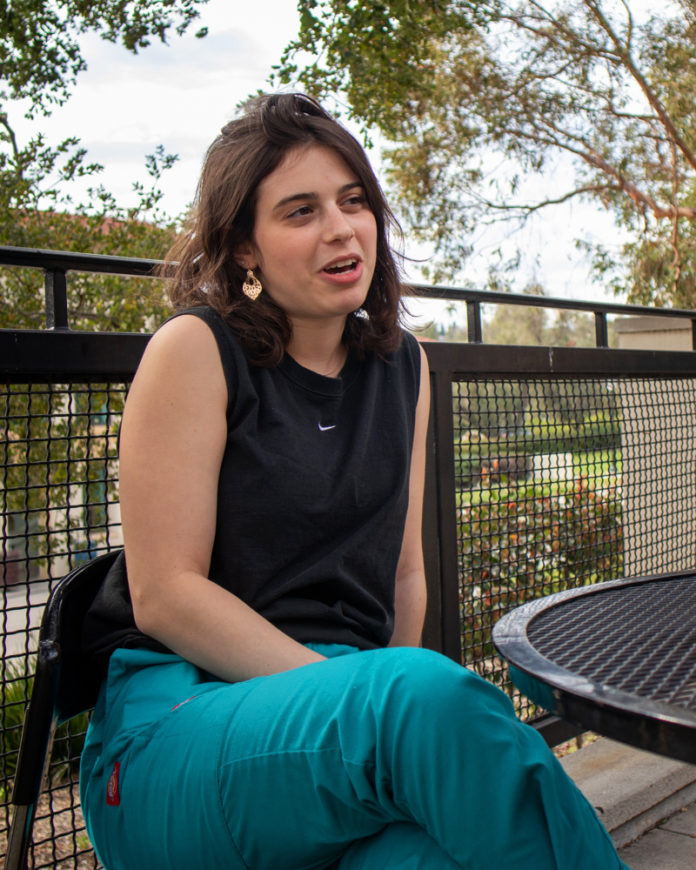
Baxter Montgomery (senior) can often be found in his blue Honda CRV with Texas plates, switching between 98.7 and 97.1 on the radio with a neatly packaged meal in his passenger seat. Montgomery delivers food for Postmates, and two to three times a week, he drives to Sunset Boulevard and waits for an app to connect him with a hungry customer whose food he will pick up and drop off.
Montgomery is one of millions of independent contractors in the U.S. who make money by working for companies like Uber, DoorDash, Wag, Rover and Postmates — jobs that constitute the gig economy. At Occidental, some students choose to work for these companies because of the convenience a flexible schedule allows. Montgomery started his job after tagging along with a friend who delivered for DoorDash a few years ago and splitting their earnings. He said he likes working for Postmates because of the minimal social interaction required.
“It’s really a five-second interaction,” Montgomery said. “And I guess that’s what I like about it. It’s just for five seconds every half hour you have to talk to someone.”

The customer interaction is brief, but critical to the most profitable component of gig economy delivery jobs: tips. As independent contractors, Postmates couriers technically work for themselves. Even if their earnings come to less than California’s $12 minimum hourly wage (set to increase to $15 by 2023), they are not required to be paid more to make up for it.
“The tips [are] obviously where all the money’s at. With a tip it’s really tricky — you never know who’s gonna tip or how they tip — but usually bigger orders tip more because it’s more expensive and they tip a percentage of their order. I got an $80 tip off this one lady, she ordered a boatload of wine,” Montgomery said. “But sometimes someone will tip you like a penny and it’s just like, ‘Why bother?’”
Spencer Nussbaum (senior) mainly made deliveries around Santa Monica and Hollywood when he worked for Postmates.
“I drove Postmates over the summer because I had an unpaid internship and just needed somehow to pay rent,” Nussbaum said. “And it really sucked.”
Nussbaum said tips are essential to making money while delivering for Postmates.
“There was one day where I was delivering for maybe three or four hours and didn’t get a single tip,” Nussbaum said. “I think I made $7 or something because they were all small deliveries with a lot of time in between them.”
Still, the customers are not the reason for most of the difficulties of the job, according to Nussbaum — those who run the gig economy companies are.
“Everyone just wants to get their food or get paid. But the people making the money are the ones who make it an unpleasant interaction overall,” Nussbaum said.
Troy Van Barter (senior) started delivering for Postmates in 2018 and said a lack of transparency with the app gave him the impression of a sketchy business model.
“It feels kind of like you’re working for a business that is trying to act legitimate with nice branding and stuff and an app that works, but the whole thing feels like it’s missing a table leg and it’s about to fall over,” Van Barter said.
DoorDash is being sued in a class action lawsuit after its employees alleged that their tips were going towards delivery fees instead of to the workers directly, a practice they said was misleading.
Nussbaum said the nature of tipping puts the burden of ensuring workers are paid fairly on the wrong people.
“It’s the problem with American tipping culture in general that restaurants really love subsidizing what they should be paying their employees with money straight from the customer’s pocket instead of just paying a fair wage,” Nussbaum said. “It relies then on people being generous, not the actual gainful employment.”
Gig economy deliverers’ status as private contractors further impacts their pay, according to Montgomery and Nussbaum.
“Technically, you are a private contractor. So you don’t really have a minimum wage that you make,” Montgomery said. “A lot of it’s basically managing what deliveries you take and how you take it, or how you do the delivery. Because, you know, if you sit and wait for like, a 30 minute order to be fulfilled, and deliver it like two miles, you could easily make three or four dollars an hour.”
Montgomery and Nussbaum both said waiting for restaurants to prepare food can be the most time-consuming and money-wasting aspect of the job.
“If you get to the place and the customer is not there within five minutes, you get to keep the food. That’s happened to me once. Unfortunately, it was a cookie cake that I didn’t really like that much,” Montgomery said.
In order to maximize earnings and reduce the chances of making such little money, some drivers have developed workarounds.
Ethan Reznik (senior) started working for DoorDash in the Claremont area the summer after he graduated high school in 2016 to make money on his own schedule. He now spends his summer and winter breaks making deliveries for Uber Eats, DoorDash and Postmates at the same time.
“These apps are not coordinating with each other because you’re probably not supposed to be doing that. You might get one order from one place, and just pray to God that if you get an order on another app, it’ll be somewhere that’s on your way to the next place,” Reznik said.

Reznik said he has gotten good at multitasking while driving.
“Handling three apps and sometimes up to six locations at once — three pickups and three deliveries — and staggering them, and going to certain places first and second and figuring that out by myself takes a lot of effort, which can get tiring,” Reznik said. “It does help make more money, but stuff does get delivered later than it probably should.”
There are other ways to make more money, according to Nussbaum, who read up on revenue-increasing strategies on Reddit while he drove for Postmates. The advice he saw fell into two categories: following what Postmates wanted its drivers to do — like automatically accepting orders and driving continuously instead of idling somewhere — and finding new ways to get the best tips from customers.
For Nussbaum, working as a Postmates courier illustrated a class component at play within the gig economy. Nussbaum worked at a Hollywood production company at the same time he worked for Postmates, and said the reaction of his colleagues when he said he worked for Postmates was surprising.
“One of the weirder things was — at the internship that didn’t pay me — mentioning that I deliver Postmates and people being seemingly shocked by that, despite not paying me,” Nussbaum said.

Hannah Chazdon (junior) spends Monday and Thursday afternoons with Wade, a poodle that she walks through Rover, a dog boarding and walking app. Chazdon started working for Rover Fall 2019, when she boarded dogs for Rover in her Norris quad. She applied when she wanted to make more than she was able to in the eight hours a week allotted for her on-campus job at Occidental’s daycare.
Chazdon said working for Rover was fun, but sometimes stressful to be responsible for the dogs.
“One of them figured out how to open my door, so that was fun. One of them peed on my bed,” Chazdon said. “One time the husky I had, I was walking him and he got out of his harness and ran away. I tracked him down near Berkus, luckily.”
Chazdon said the type of dog she watched made a big difference in the experience.
“There were some that were better fits than others, like Cookie Monster — she’s a really mini Yorkie, she’s four pounds, but she’s pretty old,” Chazdon said. “That was really easy because she’s so small and she would run around the room and be fine, but then I had a big husky once and that was not as easy.”

Montgomery continues to deliver for Postmates because he enjoys seeing a different side of LA than he does just driving through the city. He said he has discovered restaurants he never would have been to otherwise. While he acknowledges the problems with the payment model, he values his flexible schedule.
“It doesn’t pay incredibly well. You’re not gonna get rich doing Postmates. But I like the convenience of being able to just not work if I don’t want to, or if I have a lot of school work coming up, I can just take a week or two off,” Montgomery said.
For Chazdon, walking dogs for Rover provides the opportunity to get some fresh air and explore LA.
“It’s nice to have something to get me to walk around outside in LA, and sometimes I see them filming things,” Chazdon said. “I think it’s been good for me to interact with older people and earn their trust.”
Reznik continues to drive for delivery apps because he finds it to be worth it for him and does not feel affected by the cost involved.
“I don’t mind the job,” Reznik said. “I don’t worry too much about gas costs and stuff like that. It’s not a huge deal like it might be for some other people. So I think it’s mostly helpful if you are living under a certain set of circumstances, like not having to pay for your own car problems and stuff like that. My parents will take care of that.”
For Nussbaum, the experience of driving for Postmates provided insight into the student dynamic at Occidental.
“Oxy is the people ordering Postmates, not the people delivering in many cases,” Nussbaum said.
![]()




































